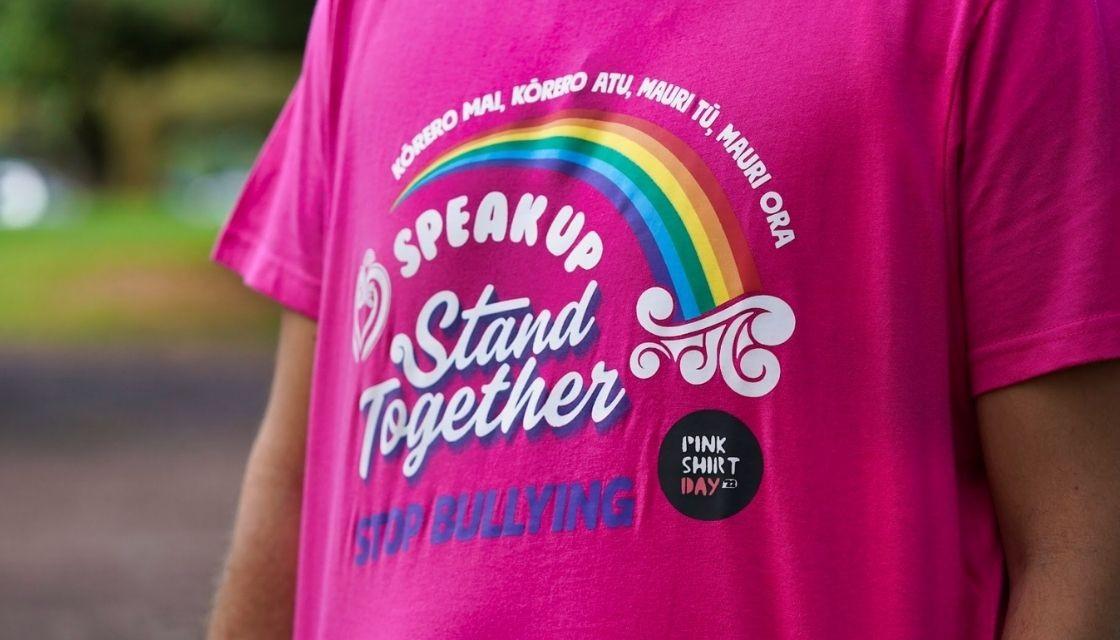
From school yards to the factory floor, from Wellington's Cable Car to Auckland's ferries, Aotearoa will be a sea of māwhero (pink) as the country unites to take a stand against bullying on Friday May 20.
Pink Shirt Day is one of the Mental Health Foundation's major campaigns and aims to bring awareness to the devastating effects bullying can have on people's mental health.
Hundreds of schools and kura will be taking part in Pink Shirt Day, with non-uniform days, bake sales or special assemblies spreading the message to be kind and respectful to each other.
Corporates and organisations are also jumping on the pink bandwagon. Wellington's Cable Car tunnel will be lit up with the Pink Shirt Day logo, staff on Auckland's Fullers Ferries will be wearing their official Pink Shirt Day t-shirts, and the crew at Bunnings are taking on a push-up challenge to raise funds. It'll even be pink on the factory floor at Tip Top as workers don pink hair nets for the day.
New Zealand has been celebrating Pink Shirt Day annually since 2009. It's a worldwide movement that began in Canada in 2007 when a couple of students bought 50 pink shirts for their classmates to wear as a show of solidarity after a new Year 10 student was harassed for wearing pink.
Raising awareness is a key aim of the campaign, but so is raising vital funds which the Mental Health Foundation uses to support workshops in schools around rainbow inclusiveness, creating resources and tools for thousands of workplaces and schools to use to promote inclusivity and diversity.

Mental Health Foundation Chief Executive Shaun Robinson says New Zealand has the third highest rate of bullying in schools out of 36 OECD countries, with 47 percent of primary students and 28 percent of secondary-aged students reporting being bullied at school.
But it's not solely an issue for young people. One in ten workers feels discriminated against or bullied at work, with people from the rainbow communities, those who identify as lesbian, gay, bisexual, transgender, queer, intersex, asexual or other sexuality, experiencing even higher rates of bullying.
"Bullying is one area where we rate near the top of the international statistics, for all the wrong reasons," says Robinson. "The research is clear that people who are bullied are more likely to experience mental health issues, such as depression, anxiety and even suicidal thoughts."
Pink Shirt Day is about creating a societal shift, so everyone can feel safe, valued and respected.
Lucy Barge, a young poet from Timaru who was bullied at primary school, has since published a book of her poems with themes around mental health, bullying and healing.
"Speaking up doesn't have to be with your own voice, it can be pen on paper, and it has helped me heal and get closure from those who bullied me," says Barge.
Auckland resident CV Shastry also experienced bullying and discrimination since moving to New Zealand in 2018 from India to study. At the beginning of the pandemic in early 2020, when he posted photos of himself and his Asian girlfriend on social media, he was told he had to leave his apartment because "he might bring COVID home".
Shastry is also sharing Pink Shirt Day values and makes sure his t-shirt gets plenty of outings. "I often like to wear my Pink Shirt Day t-shirt at work. I feel more confident and braver when I have it on."

How to take part on Pink Shirt Day
If you don't have anything pink to wear on Friday, grab yourself an official Pink Shirt Day t-shirt from Cotton On. 100 percent of the net proceeds will go to the Mental Health Foundation.
"The t-shirts have been flying off the rack this year which is really exciting," says Robinson.
"I doubt there will be many communities in the country who won't notice the popularity of pink on Friday, and I hope all those who get involved continue to wear their shirts throughout the rest of the year, after all, this isn't about being kind just one day of the year, but every single day."
Read more on how to get involved on Pink Shirt Day.
This article was created for The Mental Health Foundation.
